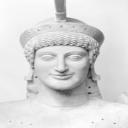Yahoo Answers is shutting down on May 4th, 2021 (Eastern Time) and beginning April 20th, 2021 (Eastern Time) the Yahoo Answers website will be in read-only mode. There will be no changes to other Yahoo properties or services, or your Yahoo account. You can find more information about the Yahoo Answers shutdown and how to download your data on this help page.
Trending News
Which pagan holidays did the Christians "steal," exactly?
Which pagan holidays were observed on Christmas and Easter?
Yule was all of December and January, and was based on the lunar calendar. Christmas is the (solar) solstice. Saturnalia was observed in early December, and had nothing to do with the solstice. The feat of Sol Invictus was implemented by Aurelian in the late 3rd century, long after the tradition that Jesus was born on December 25th (as first attested in Julius Africanus, 221 AD.
Christians didn't even call Easter "Easter" for nearly 1000 years. Are you seriously suggesting that Christians adopted the celebration of Easter but waited 1000 years before adopting the name of the holiday? And besides, there is no documented pagan holiday with the name "Easter" or "Eoster." They only called it "Easter" because the Christian pascha was observed at dawn, or "easter" (in Anglo-Saxon).
You guys realize that the Germans changed Yule to December 25th *after* the introduction of Christianity, right? Before that they didn't even have a solar calendar.
For you Easter fans, which paga holiday was observed on the first sunday after Paschal full moon following the vernal equinox?
37 Answers
- 1 decade agoFavorite Answer
Sounds like you already know the answers
Easter was defined at the First Counsel of Nicaea. Jesus was crucified during passover and the Christians wanted it defined as a separate holiday.
When Christmas was defined as December 25th is debated. However, it WAS decided when Jesus was born centuries after he died. Many cultures, not just Pagans, had winter celebrations.
There are parallels between between the Paganism and Christianity. The most likely reason would be ease of conversion. Some people say Christians stole the holidays but "alignment" would be a more accurate description.
- AmyLv 61 decade ago
It's not the specific holidays as much as it is the customs that surround them. There are so many minor holidays w/in the liturgical calendar that there's bound to be one for each of the pagan holidays.
Dec. 25th is Mithras' birthday. He was also known as the "Unconquerable Sun," a title that is incorporated into the Christian mythos. The symbols of Yule and the midwinter festival include evergreen branches (Xmas trees) brought into the house and decorated w/ light, holly w/ it's red berries (The Holly King dies at the winter solstice.), the colors red and green, Father Christmas, gift giving, caroling, and the running of the deer.
Easter's name in Romance languages refers to the Passion. In Germanic languages it takes its name from Eostre or Ostara aka Astarte, the mother goddess. The symbols of the Easter bunny and decorated eggs come from the cross quarter holiday, Imbolc, on Feb.2. On the Christian calendar it is celebrated as Candlemas.
Halloween or All HallowsEve corresponds to Samhain, the day the Veil Between the Worlds is thin and people feast w/ their Ancestors much like the Day of the Dead.
The English custom of May Day was once celebrated as Beltane. It becomes Christianized as a celebration to the Virgin Mary and it begins the Month dedicated to Her.
Whether it was to make Christianity more appealing and not too exotic to the northern Europeans or if it was aimed at the local customs which could be Christianized but not eradicated is unknown. I believe it was a bit of both. Christianity is being "sold" when people share the Good News. Missionaries need to speak the local language and know the people of an area to communicate well.
- Anonymous6 years ago
This Site Might Help You.
RE:
Which pagan holidays did the Christians "steal," exactly?
Source(s): pagan holidays christians steal exactly: https://biturl.im/Bja6v - How do you think about the answers? You can sign in to vote the answer.
- 1 decade ago
The Hebrews were pagan before they converted to one god. A lot of the Torrah/Old Testament was taken from the days before they converted. They just changed the name of the particular deity in each story to God. Exhibited by all the contradictions in God's actions. Mesopotamian priests wore Vulture wings since Vultures were a sign of transendence, and would look similar to Angels.
As the Christians, primarily Catholics, came into contact with new Pagan cultures, they simply did the same thing. They Christianized them, and incorporated them into their own.
Yule is a Germanic 12 day festival of lights starting at the Solstice. The 12th day marked the new year. Pagans used a lunar calendar. The 12 days helped make up the missing time of the year. It basically became the 12 days of Christmas. Although most other cultures had their own festival of lights at that time as well.
Imbolc is a Celtic mating/lambing Festival around February 1/2. It's primary symbol is the sheep or ewe. Catholics renamed it St Bridget's Day.
Ostara (named after Eostre) is a Germanic/Slavic festival around the Spring Equinox in March. It uses the eggs and rabbits as fertility symbols. Christians appropriated the customs and name for Easter, after they came in contact with the Germanic people.
Samhain or Halloween is a time to commemorate the dead. It is a Celtic tradition. Many other cultures had something similar. To combat this holiday the Catholics created All Saints day.
Beltaine is a Celtic life/birth/rebirth Festival in May. Although many cultures have their own May Day event. I see some of that tradition in the Ascention/Pentecost.
Lughnasaigh is a feast to commemorate the death of Lugh's mother in August. It's a Celtic tradition. The Catholic Assumption of Mary happens at that time. Lammas, which is a Germanic Festival of the First Harvest. happens at this time as well.
I'm sure if you went through all of the Pagan traditions of the world and all of the Catholic Saints days you'd find a strong correlation.
- Anonymous1 decade ago
I notice that you are using the narrowest, mordern definitions of Xmas and Easter, but then using the broadest, vaguest definitions for the pagan festivals.
It's like saying "give me a source that says pagans made a tradition of watching "It's a Wonderful Life" on NBC on Xmas Eve."
The fact that Yule didn't always take place on Dec. 25 does not alter the fact that the Xtian church took every symbol and ritual of Yule and incorporated into the Xmas holiday. The fact that there was no pagan holiday that exactly matched the Easter holiday does not alter the fact that almost every Xtian symbol of Easter has pagan roots (and the holiday itself is directly born out of Passover).
- Anonymous5 years ago
(My "you" is addressing the Q-er you linked and other Christians who feel as she does.) I can't steal Christmas. It is in the heart, isn't it? How could someone take it from you? Can I TAKE your belief? I certainly hope not! I don't WANT Christmas, and I don't NEED Christmas. I have Yule, and I consider myself fortunate. At Yuletide, everywhere I look, I see the trappings of Yule celebration! I see Yggdrassil, draped in finery and offerings. I see friends gifting each other, the heart of what it is to be Heathen! I see Polaris, Tyr's home, topping Yggdrassil. I see mistletoe and evergreen boughs strung around. I hear carroling and wassailing. I see toasting and revelry. Even the guy who flies thru the sky, bestowing blessings on the stout of heart, and associated with the number 8, speaks to what Yule is for me. And on or about Twelfth Night, people make promises for the coming year. Sure, you might see some stuff from other paths, a Menorah here, a Nativity there, but far and wide, it is all Yule, and I am blessed to be surrounded by it all season long! What more could a Heathen want? Crystal asks- How does my wanting Christians to simply accept that theirs is not the ONLY way equate to trying to "take Christianity away"? Tyrs- What they covet is their exclusivity. Fort people like that poster, it just burns them to think that THEIR "reason for the Season" isn't the ONLY reason for the season. I am a cashier at a very busy WalMart, and about half the people I say Happy Holidays to get mad at me for not saying Merry Christmas. And when I say, "Why would I? I am not Christian?" They say, "Well it IS The Reason For The Season". They get even more upset when I say, "It may be YOUR reason, but it's not MY reason". Frankly, I think it's not very nice to corner someone with this ISSUE when that person is trying to WORK. I can't very well walk away, now can I? And these people know it and take full advantage of it.
- Anonymous1 decade ago
answer: Slavic winter solstice is celebrated between Dec 24-31st.
Celebration to Sol Invicticus (Roman) on 12/25
Yule is celebrated from 12/21-31st
Mithra's date of birth 12/25
Feast of Horus 12/25
# # #
Easter
a movable feast of the celebration of Spring in all pagan calendars.
Here's one for you - name something about your Christmas that isn't pagan, including the virgin birth.
Or how bunnies and eggs fit in with your spring holiday?
# # #
You're incorrect. Yule is the 12 days and nights between the solstice and the 1st. No, it was not the month of Dec - your Christian writer didn't know what he was talking about.
Saturnalia had everything to do with the solstice. Check out some actual Roman history, not your revisionism.
- Yankee DLv 41 decade ago
The pagan holiday of "Easter" is actually for Astarte, the goddess of fertility. It was part of the Mithra religion which was a "mystery" religion and it's roots can be traced back to ancient Babylon. Astarte was the goddess of fertility, and incidentally also the real person was the wife of Nimrod, builder of Babylon and the Tower of Babel. Dec 25th or thereabouts was the birth of their son, who in Roman mythology became known as Saturn.
- Anonymous1 decade ago
They didn't necessarily "steal" the holidays, but they "borrowed" dates and customs. The Winter Solstice and the Vernal Equinox are the more obvious ones. Things like the Christmas tree, giving presents, some fantastical person going around giving presents to good kids and coal to bad kids, the Easter bunny, and coloring eggs are Pagan traditions. It was easier for the Christian based governments to make conversion smoother by allowing people to keep their beloved customs and whatnot.





